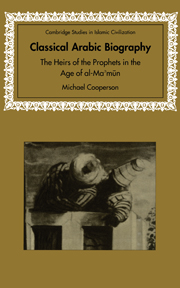Book contents
- Frontmatter
- Contents
- Preface
- Acknowledgements
- List of abbreviations
- Note on transliteration
- Note on dating systems
- Glossary
- 1 The development of the genre
- 2 The caliph al-Maʾmūn
- 3 The Imam ʿAlī al-Riḍā
- 4 The Ḥadīth-scholar Aḥmad Ibn Ḥanbal
- 5 The renunciant Bishr al-Ḥāfī
- Conclusions
- Appendix: The circumstances of ʿAlī al-Riḍā's death
- Bibliography
- Index
2 - The caliph al-Maʾmūn
Published online by Cambridge University Press: 28 July 2009
- Frontmatter
- Contents
- Preface
- Acknowledgements
- List of abbreviations
- Note on transliteration
- Note on dating systems
- Glossary
- 1 The development of the genre
- 2 The caliph al-Maʾmūn
- 3 The Imam ʿAlī al-Riḍā
- 4 The Ḥadīth-scholar Aḥmad Ibn Ḥanbal
- 5 The renunciant Bishr al-Ḥāfī
- Conclusions
- Appendix: The circumstances of ʿAlī al-Riḍā's death
- Bibliography
- Index
Summary
Go away and leave me alone with my deeds, for none of you can help me now, or avert whatever punishment might befall me. But stand together, all of you, and speak well of me if you can. If you know of evil I have done, refrain from mentioning it, for I will be taken from among you [and judged] by what you say.
From al-Maʾmūn's deathbed speech, as reported by al-ṬabarīIntroduction
According to Muslim tradition, the institution of the caliphate began in Medina, at the roofed assembly hall (saqīfa) of the tribe of Sāʿida. When the Prophet died in 11/632, the community split into three camps. His daughter Fāṭima, her husband ʿAlīb. Abī Ṭālib, and their followers “withdrew” to her house. The rest of the Meccan emigrants – the Muhājirūn – gathered around Abū Bakr and ʿUmar. Meanwhile, the Muslims native to Medina – the Anṣār – assembled at the Saqīfa. When they learned of the meeting, Abū Bakr and ʿUmar hastened to the Saqīfa as well. There they found the Anṣār preparing to elect a new leader and thereby wrest the leadership of the community away from the Muhājirūn.
- Type
- Chapter
- Information
- Classical Arabic BiographyThe Heirs of the Prophets in the Age of al-Ma'mun, pp. 24 - 69Publisher: Cambridge University PressPrint publication year: 2000

